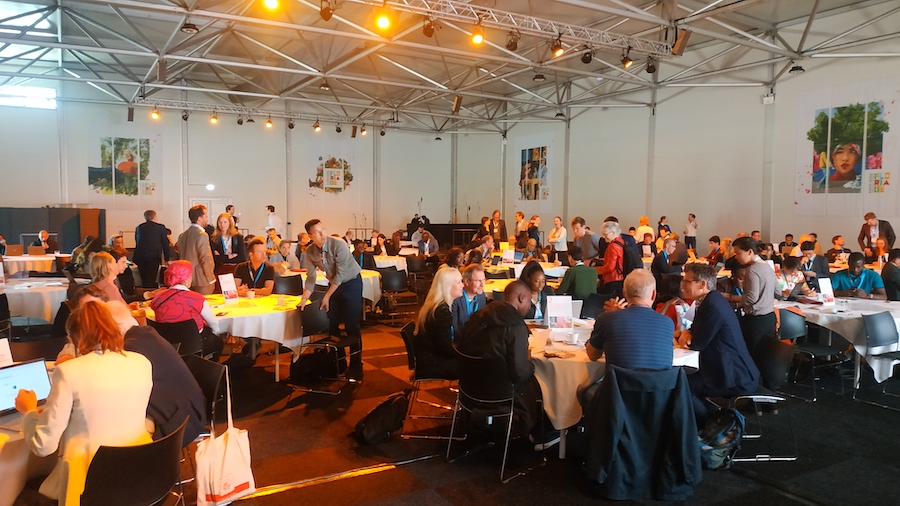Water-Energy-Food-Nexus: Solving Urban Challenges Together
According to the United Nations: “..the water-food-energy nexus is central to sustainable development. Demand for all three is increasing, driven by a rising global population, rapid urbanization, changing diets and economic growth”. The WEF-nexus relation is incorporated in the Sustainable Development Goals (SDGs): SDG-2 (food), SDG-6 (water) and SDG-7 (energy). Since these are interlinked, doing business as usual is not an option. Therefore, stakeholders in each specific country have to apply a water-energy-food nexus approach and identify barriers and challenges.
Collaboration of Urban Stakeholders
On June 4, 2021, Global Compact Network Netherlands and Closer Cities hosted an online Round Table that brought together urban stakeholders, such as Arcadis, PostNL, Proptech NL, RSM, Gemeente Leeuwarden, Witteveen+Bos, and others, to tackle urban challenges. They explored how cities can make better use of urban knowledge that the private sector has developed over years to create more sustainable and livable cities and how collaboration could lead to the positive change in the realization of SDGs.
To intensify the connection, organisations partnered on the international conference on ‘Water-Energy-Food nexus in cities’ that took place on May 12, 2022 at the Floriade Expo in Almere, the Netherlands. The WEF-nexus conference connected over 150 experts from the private sector, public sector, knowledge institutes, NGOs, civil society, and international delegations during the 3 roundtable discussions. The event revolved around Solving Urban Challenges Together, aligned with the philosophy of the Netherlands.

How do cities deal with challenging interdependencies between water, food and energy?
Food production related to efficient use of energy and water can be very challenging. The Water-Energy-Food nexus is full of complicated interdependencies. Decisions in one field will often have consequences for the other two.
During the one-day international conference on Water-Energy-Food nexus in cities, experts and participants focused on the exchange of effective local approaches and discussed questions like: how can we scale up good practices? What role do context variables – like climate, city size, geography, governance – play in the exchangeability of effective approaches? What can stimulate the co-creation of effective approaches? The experts represented various WEF-nexus related projects, such as accelerating climate ambitions in cities through public private partnerships; adaptive horticulture in Dubai, UAE; farm of the future in Lelystad, Netherlands; training of farmers in Kumasi, Ghana; city-region food systems approach related to water, energy, food.
Role of private sector in WEF-nexus
The private sector has an essential role to play in the WEF-nexus, holding pivotal knowledge in addressing the water, energy, and food challenges.
One element of contribution is technology and innovation, driven by the private sector, that helps to improve efficient use of water, energy and food and ensure security of the natural resources.
Another important factor is leadership and ambition. For instance, UN Global Compact members are involved in the initiative CEO Water Mandate that mobilizes business leaders on water, sanitation, and the Sustainable Development Goals.
Key Takeaways from WEF-Nexus Conference
The first round of discussion uncovered which knowledge was present in the room and how these projects, experiences, and ideas of participants helped realizing the SDGs. Sandra Pellegrom (SDG coordinator, Dutch Ministry of Foreign Affairs) and Gillian Martin Mehers (founder and CEO Bright Green Learning) were interviewed about sustainability and sharing sustainable solutions.
The second round tried to monitor how urban knowledge sharing is done so far: Ellen Minkman (TU Delft), Peter Scholten and Jet Bakker (IHS) concluded that one-way transfer, two-way exchange and co-creation exist. Which boosts and barriers do stakeholders experience while sharing their knowledge with others? Trust among sharing partners, open communication and establishing a clear goal were considered most stimulating, while key barriers include speaking different languages or using different jargon, politics and legislation, and power dynamics.
Finally, participants discussed the next steps: what is necessary to expand urban knowledge sharing? Negar Noori (EUR) and Robbert Nesselaar (Co-founder Closer Cities) introduced the metaphor of knowledge “transplantation” and raised the question when a city is comparable enough to share with. The table discussions quickly concluded that the issue is not about finding cities that are comparable, but about having comparable challenges or a comparable context.
Global Compact Network Netherlands stressed the importance of speaking the same language—the universal language of the 17 SDGs— for collaboration between the private sector, government, and the public sector. Speaking the language of the SDGs within this triple helix enhances the ability for different actors to tap into the knowledge of the private sector (and the other way around) and co-create solutions around the SDGs. For the private sector, it is crucial to establish collaboration in an early stage and to cooperate with municipalities in a pre-competitive phase to tackle urban challenges together and contribute to the realization of the SDGs.
Arcadis—a loyal member of Global Compact Network Netherlands— added to that by emphasizing the significance of sharing similar objectives between the public and private sector and creating mutual benefits to make cities comparable enough to share with and improve the urban knowledge sharing among them.
About Closer Cities Project and the WEF-nexus page
Closer Cities is a 10 -year urban research project (2021-2030) dedicated to developing a better understanding of urban knowledge sharing to help achieve the UN Sustainable Development Goals. Closer Cities is a non-profit initiative based on partnerships and cross-border collaboration with knowledge institutions, NGO’s, municipalities, governmental institutions, and the private sector. If you are working or have worked on a WEF-nexus project, Closer Cities invites you to share your project at the WEF-nexus page. For updates on events, research, urban projects, and news, refer to this website: www.closercities.org.
